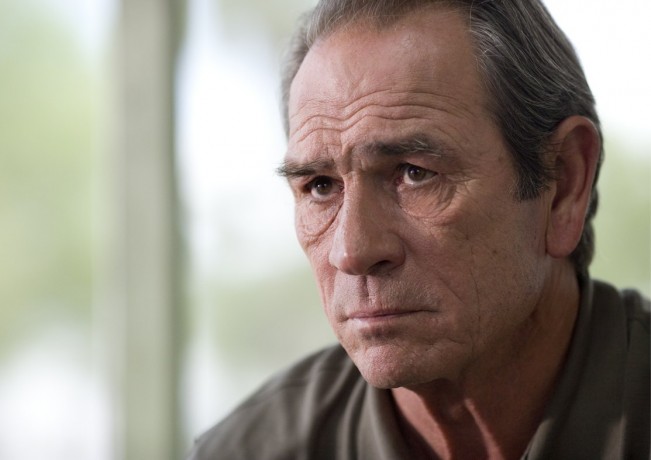By Jake Howell jake.howell@utoronto.ca
Countdown To Cannes: Tommy Lee Jones
The first in a series of snapshots outlining the eighteen directors in the 67th Palme d’Or Competition.
 Background: American; born San Saba, Texas, 1946.
Background: American; born San Saba, Texas, 1946.
Known for / style: The Three Burials of Melquiades Estrada, The Fugitive, TV’s “Lonesome Dove” series, No Country for Old Men; The Good Old Boys; a gruff, dour disposition; acting in (and directing) Westerns, both contemporary and period.
Notable accolades: As directing is still a sidebar to the Tommy Lee Jones franchise, Jones’ acting awards usually receive first bill. At the top of the list is his Best Supporting Actor Oscar for 1993’s The Fugitive, but close behind are his three other Academy Award nominations (Best Supporting Actor, Lincoln, 2012; Best Actor, In the Valley of Elah, 2007; Best Supporting Actor, JFK, 1992). Jones also won Best Actor at the 2005 Cannes Film Festival for The Three Burials of Melquiades Estrada, which he directed. He also can brandish a fistful of BAFTA, Emmy, and Golden Globe nominations.
Film he’s bringing to Cannes: The Homesman, an Old West oater adapted from the 1988 novel by Glendon Swarthout (Where The Boys Are, The Shootist). From the IMDb plot summary: “A claim jumper and a pioneer woman team up to escort three insane women from Nebraska to Iowa.” Winning both the Spur and the Wrangler awards for Best Western Novel of 1988, The Homesman is the seventh film to be adapted from Swarthout’s canon. The film features Oscar-noted talents Tommy Lee Jones, Hilary Swank, Hailee Steinfeld (True Grit), Meryl Streep and John Lithgow.
Previous Cannes appearances: Tommy Lee Jones’ only Cannes appearance (as director) is 2005’s The Three Burials of Melquiades Estrada, which played in Competition. It won Jones the Best Actor prize.
Could it win the Palme? On the acting alone, any film with Hilary Swank, Meryl Streep, and Tommy Lee Jones is going to be intimidating. But Jones is directing inside his favorite milieu with the American Old West, and he’s wrangled Academy Award-nominated Mexican cinematographer Rodrigo Prieto (The Wolf of Wall Street, Argo, Brokeback Mountain) to capture the glorious environments and Academy Award-nominated Marco Beltrami to score the film. While Oscar voters and Cannes juries rarely align, it’s still hard to discount the forces at work here, and the artistic merits of The Three Burials of Melquiades Estrada speak to the strength of Jones’ directorial whip-cracking. If The Homesman leaves the South of France empty-handed, it could mean that we have a very strong slate indeed.
Why you should care: Like a cowboy and his rifle, Jones and good Westerns go hand-in-hand. Fans of the genre should look forward to one made by someone who clearly loves them, and Jones has brought along Western veterans and Oscar favorites for the ride. With The Homesman, we’ll also check in again on Hailee Steinfeld, whose last Western outing earned her a Best Supporting Actress Oscar nod (2010’s True Grit). If nothing else, though, expect this film to gallop its way into a number of awards categories later in the year.
Follow Jake Howell on Twitter: @Jake_Howell
















One of my favorite actors!!!! If Tommy Lee Jones is in it you can bet he’s bring his A game. Anxiously awaiting its arival in the states!!!
I can not wait!! For the release of this film. The trailer is wonderful. Tommy Lee Jones has another Classic Western on his hands!!!